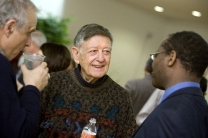VIEWPOINT
The paradox of a 'global Cornell'
What constitutes a global Cornell? Is it the global presence? Is it the preparation of global citizens? Is it the contribution to solving global problems? In principle, it is all of these, and in part it is all of these, but unfortunately, a non-coherent part.

Gilbert Levine See larger image
As one can see from the examples in this issue of Ezra, Cornell has a significant international presence, with the Weill Cornell Medical College in Qatar a physical example, but with a variety of activities that link Cornell to the broader international community. Some are educational, e.g. the Law School linkages in France and Germany; the Rome program of the College of Architecture, Art and Planning; and the student exchanges with a number of universities abroad. Some are research-focused, including 88 memoranda of agreement that Cornell has with academic and research institutions around the world. Some are focused on real-world problems, such as the Durable Rust Resistance in Wheat project of the College of Agriculture and Life Sciences, and the Mediterranean Water Initiative of the College of Arts and Sciences, CALS and Engineering. Some are a combination, as exemplified by the activities of the Mario Einaudi Center for International Studies and the Cornell International Institute for Food, Agriculture and Development.
But these are only part of a global Cornell. What's missing?
For the preparation of students for work and life in a global world, Cornell has a permissive rather than guiding environment, exemplified by graduation requirements. There is no university requirement for study of a foreign language, though there used to be. Only two schools have such a requirement for graduation. We have a flexible study abroad program, but there is no university requirement that students have a significant international experience. We have myriad courses that address world issues, but no core of courses from across the university that would ensure our graduates have at least the basic understanding of the world in which we live -- a complex mix of cultures, economies and political systems based in a physical world of amazing variety. Should there be more guidance?
Cornell's contributions to solving global problems can be found in the laboratories and libraries on the Ithaca, New York City, Doha and Geneva campuses. Probably the most important is the education Cornell has provided to its international students since the university's beginning. But Cornell also has been a major contributor to the pool of individuals who dedicate their lives to addressing major world problems. They can be found in international research centers, in the rice and wheat fields of Asia and Latin America, in the offices of world and regional development banks, in government agencies and nongovernmental organizations. But these contributions are primarily by individuals -- faculty and graduates, and occasionally by colleges, but rarely by focused effort of the university. Can the university focus its efforts more effectively?
We have an unparalleled combination of academic resources, faculty and students, a long history of international involvement and a land-grant tradition of service. But we have no university commitment to becoming a truly global Cornell. With the possible exception of the establishment of the medical school in Qatar, where, clearly, the trustees and central administration expressed a university view, in almost all of the examples cited, the direction and initiatives were the result of the individual or of small groups of faculty members, and by college leadership. Is there a need for a university view?
If the answers to the questions posed above are "Yes," then the next question is "How?" While the occasions on which the university can express itself as an entity are relatively few, there can be a university perspective on its roles. To articulate that vision, and to provide the leadership in fostering it, is the responsibility of the president, the provost and the vice provost for international relations. To carry it out, however, requires the commitment of the colleges, the dedication of the faculty and the enthusiasm of the students.
Gilbert Levine is professor emeritus and interim director of the Mario Einaudi Center for International Studies.